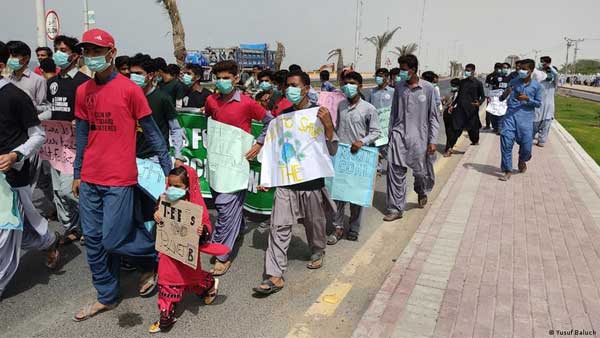
How Fridays for Future keeps the spotlight on the climate
Germany, Mar 25: "We are often asked if now is the time for a climate strike. After all, there are other crises, like the Putin one, to tackle."
With these words, German activist Elisa Bas addressed reporters ahead of Friday for Future"s tenth global strike on March 25.

For the past two years, the youth-led climate movement has not only been organizing around COVID measures — which limited its trademark demonstrations — but also around a barrage of headlines. The pandemic, the Taliban takeover in Afghanistan and the war in Ukraine have dominated the news cycle for months and even years on end.
But much of the movement has decided it needs to integrate other emergencies into its activism instead of vying for attention.
"We"re not trying to have crises compete against each other," said Jule Pehnte, an activist with Fridays for Future Germany. "We shouldn"t treat them individually, but question the systems behind them. For example, the war in Ukraine is a war financed by our fossil fuel purchases."
At the latest global strike, the German chapter will not only demonstrate for climate justice but also for peace by showing solidarity with Ukraine. The goal is to convince leaders to stop buying Russia"s fossil fuels and transition to renewable energy. A move that would stifle Vladimir Putin"s economy and help the climate at the same time.

A shift towards social issues
Each Fridays for Future chapter interpreted the global strike"s rallying call "People Not Profit" in its own way. Mexican activists decided to highlight Indigenous, LGBT and women"s groups to show how their experiences overlap with climate concerns.
"It's actually easy to connect the issues because the climate crisis is also a social crisis," said Regina Cabrera of Fridays for Future Mexico. She added that it is hard to separate the environment from topics like land grabbing, fighting over limited resources or overconsumption.
According to Darrick Evensen, a professor of environmental politics at the University of Edinburgh, the youth activists" message has shifted more towards such social issues during the pandemic, possibly because people have been confronted with secondary effects of the COVID crisis.
"The rhetoric is changing," he told DW last year. "It does seem that this really heavy focus on science is waning, and it's become more of a blended image in terms of the interests that are being represented."
Yusuf Baluch who organizes with the chapter dedicated to "most affected people and areas," Fridays for Future MAPA, has also noticed this evolution. Before moving to the UK, he lived in Balochistan, a region administered between Pakistan, Afghanistan and Iran. Once the pandemic forced his activism online, he says, it connected him with numerous organizers abroad who all shared their experiences.
"We got to know about each other"s resistance and struggles," Baluch said. "We started talking more about how issues like gender equality, Ukraine, Palestine, Afghanistan, the AIDS crisis are interlinked with the climate crisis."
Brushing over climate struggles
But some activists can"t help feeling frustrated that climate concerns often only make it into the limelight if they are attached to other issues making international headlines.
Activist Joy Koech from Fridays for Future Kenya says she doesn"t want to diminish the crises abroad. Still, she is sometimes worried that her country"s climate struggles — floods and droughts plunging millions into a humanitarian disaster — are rarely perceived as urgent.
"We might be the ones feeling the most impact of the climate crisis right now, but sooner or later everyone will," she said.

For Pehnt from the German chapter, it can also be disheartening when the media brushes over political decisions that could be detrimental to the environment. Nevertheless, she thinks it"s important to use the opportunity to bring attention to climate issues when they overlap with major news stories.
"We try to combine the issues instead of reacting with frustration," she said.
Fellow activist Luisa Neubauer would even go as far as saying that it is the movement"s duty to connect the dots for the public. In the case of the war in Ukraine, it's about unmasking the energy debate behind the war.
"There won't be real peace and an unsustainable planet. There won't be real peace and a world where our energy systems rely on the friendliness of an autocrat next door," she said.
"That's why peace and climate justice cannot be separated from each other."Edited by: Tamsin Walker
Source: DW


 Click it and Unblock the Notifications
Click it and Unblock the Notifications


































